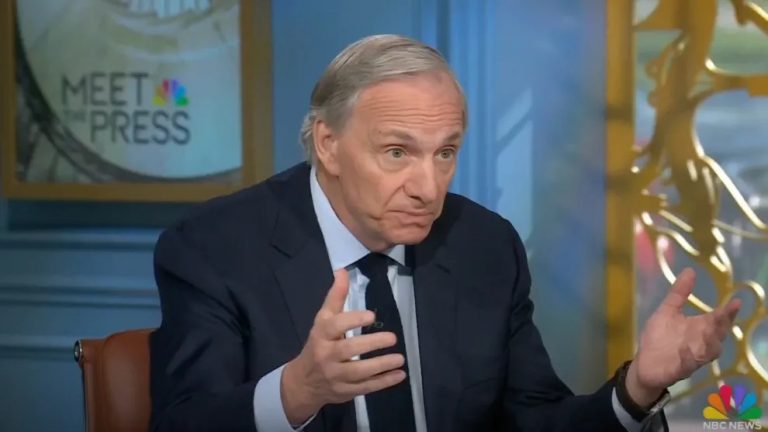
Ray Dalio, founder of Bridgewater Associates and one of the most respected voices in global finance, has joined a growing chorus of economists and Wall Street heavyweights warning that President Donald Trump’s sweeping tariffs are pushing the United States, and possibly the world, toward a deep economic downturn.
In an appearance on NBC over the weekend, Dalio said the American economy is “very close to a recession,” adding that the aggressive and unpredictable rollout of tariffs has already dealt serious damage to business confidence and market stability.
“Right now, we are at a decision-making point,” Dalio said. “What was put in there is like throwing rocks into the production system. Those impacts would be enormous in terms of the efficiency of the whole world.”
Register for Tekedia Mini-MBA edition 19 (Feb 9 – May 2, 2026).
Register for Tekedia AI in Business Masterclass.
Join Tekedia Capital Syndicate and co-invest in great global startups.
Register for Tekedia AI Lab.
Dalio was referring to President Trump’s broad-based tariff regime, which has targeted nearly every major U.S. trading partner and upended decades of global trade consensus. While the stated goal is to revive American manufacturing and reduce dependence on imports, the reality has been far more chaotic — with businesses, investors, and economists raising alarm over the consequences.
Last week, after jolting markets with a surprise announcement of reciprocal tariffs on nearly all foreign countries, Trump extended the implementation by 90 days, a move that did little to calm nerves.
The damage was already being felt. On April 2, a massive selloff wiped out over $10 trillion in global market capitalization in just two trading days. The Dow Jones Industrial Average plunged over 2,000 points, triggering automatic halts in some markets and sparking fears of a financial chain reaction.
That moment became a flashpoint
“If something wipes out $10 trillion of Market CapEx in two days, you’re probably on the wrong track,” said Professor Jeffrey Sachs of Columbia University, a longtime economist and adviser to governments around the world. “The United States is on the path of WRECKING the world economy once again,” he said, directly blaming the White House’s erratic trade maneuvers.
The collective view from the economic community is growing more urgent. A chorus of voices have warned that the U.S. tariffs are having a domino effect, disrupting global supply chains, raising costs for businesses, and creating a climate of extreme uncertainty.
In a post on X, Dalio emphasized that the tariffs reflect something far deeper than a tactical trade dispute.
“The far bigger, far more important thing to keep in mind is that we are seeing a classic breakdown of the major monetary, political, and geopolitical orders,” he wrote. “This sort of breakdown occurs only about once in a lifetime, but they have happened many times in history when similar unsustainable conditions were in place.”
“This is a great time for all involved to reconsider their approaches! There are better and worse ways of handling our problems with unsustainable debt and imbalances, and President Trump’s decision to step back from a worse way and negotiate how to deal with these imbalances is a much better way,” he added.
Sachs echoed this sentiment, warning that the economic nationalism Trump is pushing is eerily reminiscent of historical episodes that ended in global depressions and war.
“When the world’s largest economy starts dictating terms without consensus, it leads to fragmentation, not cooperation,” he said in a follow-up interview.
Wall Street joins in
Jamie Dimon, CEO of JPMorgan Chase, said last week that a recession is now a “likely outcome” for the U.S. economy.
“I mean, when you see a 2,000-point decline, it sort of feeds on itself, doesn’t it,” Dimon said on Fox Business, suggesting that market panic is morphing into a feedback loop of pessimism and reduced investment.
Larry Fink, CEO of BlackRock, the world’s largest asset manager, went further.
“I think we’re very close, if not in, a recession now,” Fink said during an interview on CNBC. “We now have a 90-day pause on the reciprocal tariffs — that means longer, more elevated uncertainty.”
Both Fink and Dimon warned that even if a resolution is reached after the 90-day extension, the trust in stable U.S. trade policy may already be broken, a point also stressed by Dalio. Businesses, Fink noted, are already holding back capital expenditures, uncertain of how to price future risk.
The global toll
The International Monetary Fund and the World Bank have already slashed their growth forecasts in response to the volatility. Global trade volume growth has stagnated, foreign investment is slowing, and emerging economies dependent on exports are bearing the brunt.
China, which has become the main target of Trump’s tariff crusade, responded in kind with its own set of retaliatory duties, some reaching up to 125%. In Beijing, officials accused Washington of using tariffs as an economic weapon and warned of “unintended consequences that may spiral out of control.”
Though Trump initially exempted certain items like smartphones and semiconductors, his broader tariff scheme now touches nearly every industry — from agriculture to aviation, autos, consumer goods, and pharmaceuticals. The president’s decision to include allies like the European Union, Canada, and South Korea in his tariff dragnet has further deepened diplomatic rifts.
American farmers have already seen their exports to China collapse, and manufacturers are reporting higher input costs and canceled contracts. Supply chain managers in major U.S. firms say they are scrambling to adjust logistics as prices rise and relationships with overseas partners fray.
July now looms as a critical turning point. Trump’s 90-day grace period was intended as a time for negotiations and review. But if no agreement is reached, the full slate of tariffs, amounting to hundreds of billions in penalties, could go into effect, triggering what some economists are calling “a coordinated global recession.”
Dalio warns that the damage already done may take years to unwind, even if the tariffs are reversed.



